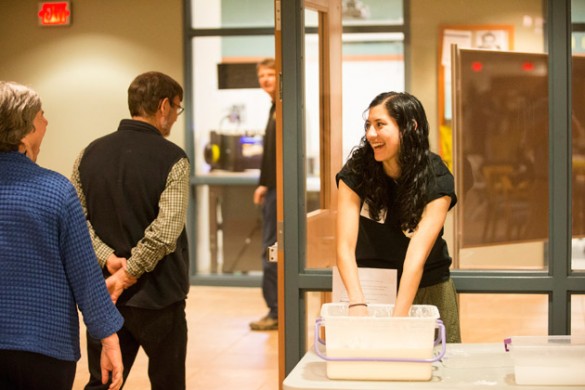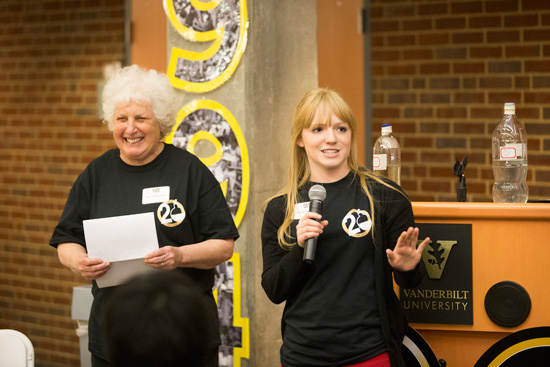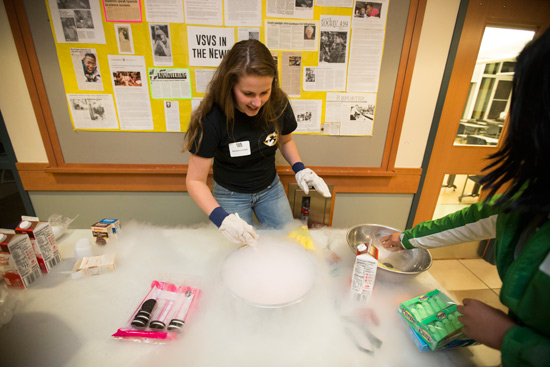
For Class of 2014 graduate Leandra Fernandez, one of the “most fulfilling and meaningful” aspects of her time at Vanderbilt was serving as a member of Vanderbilt Student Volunteers for Science. VSVS recently celebrated 20 years of bringing hands-on lessons to middle school students in Metro Nashville Public Schools.
Fernandez, a biomedical engineering major with a minor in Spanish, grew up going to science camps in Albuquerque, New Mexico, so she was naturally drawn to VSVS. “It seemed like a great way to give back and pay it forward to the next generation of students,” she wrote by email while attending the U.S. Science and Engineering Festival as a representative of Vanderbilt.
As so often happens, her volunteer work ended up shaping her vocational plans. Instead of entering the engineering field, Fernandez chose to “switch gears” after graduation. She has accepted a post-baccalaureate fellowship with the Carnegie Foundation for the Advancement of Teaching, a two-year program during which she will edit a math curriculum for a community college.

“So many times I see undergraduates, such as Leandra, join VSVS as an extracurricular activity and then find that their interaction with budding young scientists is one of the most gratifying parts of their college experience,” said Pat Tellinghuisen, VSVS staff director.
Fernandez and more than 650 Vanderbilt students partnered with 123 classroom teachers in 10 schools this academic year. The experiments are fun to watch and always relevant to the curriculum, explained Tellinghuisen.
Merkle Moore, one of several Vanderbilt students and MNPS teachers who spoke during the recent 20th anniversary celebration, remembered the impact of VSVS on her own fifth-grade Metro science class.

“I never hated science, but I was never enthusiastic about it. The science experiments we performed were literally watching ice melt. It was just something I had to get through to get to math class,” Moore remembered. Enter the VSVS cryogenics demonstration, during which a banana is impressively used to hammer a nail into wood. “I thought that was the coolest thing.”
Now a rising Vanderbilt junior and a VSVS volunteer, Moore also works in the VSVS lab to help prepare and clean the science kits. Her mother, Amy Moore, is a fifth-grade science teacher at Head Middle Magnet. Moore’s sixth-grade teacher, Thomasena Wood, received an award during the VSVS celebration as one of the program’s founding teachers.
“It was extremely gratifying to bring together so many who have been touched by VSVS over the years–from students who grew up and learned to love science to teachers whose classroom experiences have been enriched by this interaction. I’m not sure we could have envisioned 20 years ago how many people we could excite about the wonders of science,” Tellinghuisen said.
Moore was certainly one of those students, adding: “VSVS opened my eyes that science was something enjoyable, not something to get through.”
Even when she’s preparing the smelly cabbage juice kits that help young students understand pH balance, Moore believes it’s all worthwhile: “I look at these kids and think: One of them is going to invent something important one day.”
Meanwhile, Fernandez has been amazed by the kinds of college experiences, such as VSVS, that have turned out to be the most meaningful for her. Volunteering at a School of Engineering open house earlier this spring, she fielded questions from prospective students and their parents on topics one might expect: class size, availability of professors, opportunities for research. These were similar to the questions she and her parents asked when considering Vanderbilt.
“But as a senior, it became clear to me that those academic experiences, while obviously important and meaningful, were not what defined my college experience,” Fernandez said. “Organizations such as VSVS, programs such as Rites of Spring or Casino Night, performances put on by the university or student groups, and the insight I gained by meeting and befriending students from a wide variety of races, cultures and religions are the things I consider most important in making my Vanderbilt experience what it was.”